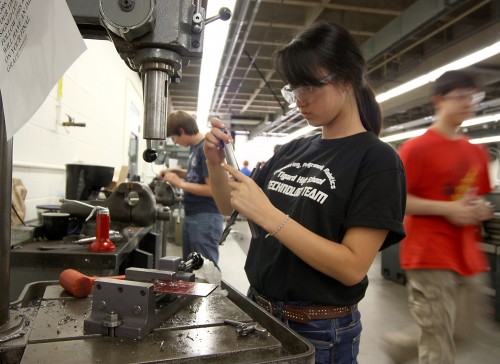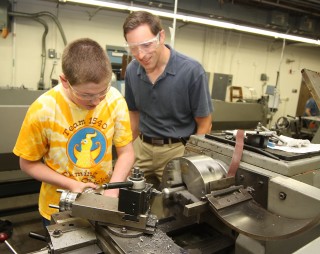This content was published: September 9, 2013. Phone numbers, email addresses, and other information may have changed.
PCC expands opportunities for girls in machine manufacturing
Photos and story by James Hill
The Portland Community College Foundation has raised more than $30,000 from local businesses and organizations to fund a new all-girls FIRST (For Inspiration and Recognition of Science and Technology) robotics camp and strengthen its current boys and girls camp.
Thanks to money provided by Mentor Graphics, Juan Young Trust West, Wheeler Foundation, FEI and TriQuint, the college hosted not one, but two robotics summer camps at its Sylvania Campus (12000 S.W. 49th Ave.). Offered through PCC’s Machine Manufacturing Technology Program, the camps provide high school students with hands-on learning opportunities in machine shop theory, lab time with machines and the engineering basics of robotics. In addition to the funds raised, the college provides in-kind support and funding from a National Science Foundation STEM (science, technology, engineering, and mathematics) grant.

Lynn Tran, a 17-year-old from Tigard High School, works on a robotics part during her lab at the Sylvania Campus.
“Previously, it was just one camp and the majority were boys,” said Kim Kono, PCC Foundation development director. “Funders really loved the idea of supporting an all-girls camp and providing STEM skills to young women.”
Recently, PCC hosted 40 local high school students in the two FIRST Robotics Shop Training Summer Camps, attracting students from Tigard, Tualatin, Hillsboro, Beaverton, Westview, Lake Oswego, Wilsonville, Scappoose, Camas, Washougal and Eugene school districts as well as from Portland Public Schools like Franklin, Cleveland and Benson, plus a team from local private school Catlin Gabel. About 22 of the 40 were girls, which is a big step up in numbers from recent years.
PCC becomes national leader in providing access
The boys and girls robotics camps are unique among community colleges nationally and fill an important need locally. Many students on FIRST robotics teams are from high schools where shop programs have been cut or seriously reduced due to budget woes. PCC officials say that this lack of access can hinder skill development.
In response to this trend, PCC Machine Manufacturing Technology faculty Pat Kraft came up with the idea six years ago to assist FIRST robotics students in learning the theory and practices of machine manufacturing to help them build the robots for state and regional competitions. Because private partners of high schools couldn’t allow students to use their machinery or labs for liability reasons, PCC jumped in to fill the need.
“No other local college is filling the gap of providing hands-on experiences for high school youth in the areas of engineering, machine manufacturing, and robotics technology in this unique way,” Kono said. “We are also unaware of training provided by colleges on the national level to local teams. This project uniquely enables PCC to create a pathway from high school to college to the skilled workforce.”
STEM skills needed for future
The focus of the camps, offered July through August every year, is to have the students complete MCH 121, which is a four-credit college class within the machine manufacturing technology program. They learn shop safety, how to use measuring tools, drawings and sketching, and how to use hand tools, band saws, metal cutting lathes and milling machines.
A key to both camps is that all of the participants are enrolled in a three-credit MCH 158 shop project class that is left open for 12 months to allow the students use of PCC’s machine manufacturing lab and its staff.
“It gives kids access and a view of what a community college experience could be,” said Alex Vins, a manufacturing technology instructor who teaches the camps. “It’s a really good, positive and economical experience for them.”
Dan Findley, division dean of Math and Industrial Technology at the Sylvania, said it’s all part of grooming youths for what employers will want – people who can compute, use math, communicate with co-workers, collaborate across groups and use high-tech tools adeptly – all skills that are fostered at these camps.
“That for me adds up to tremendous value in terms of giving them choices and options for the future,” Findley said. “That value translates into knowing where they want to go, what they want to do later on, and being able to essentially command their future.”



I love opportunities like this. Can I get some information about this camp and future events?
Awesome stuff. I missed out pretty badly though. I wanted to change to Machining too. Would have liked a ‘head start’ into this with that course.
When are we going to stop dividing by sex and race? I work with FIRST students, by the hundreds. There is nothing preventing girls from participating. By making a segregated team you are keeping the past alive, creating victims where there are none. These people will not have segregated jobs, will they? Stop already, support all kids equally. Go to the FIRST robotics competition and see that I am right before you judge my words.
@phil I’ll bet you wear a fedora.
With PCC credit enrollment at 53% female (Spring 2013 statistics), isn’t it a great idea to encourage young women to get a sheltered learning experience in a field that is dominated by men. In my opinion, the all-female FIRST is not “keeping the past alive” but allowing us to help our students change the future. With the competition of globalization, we will need all of our resources–men and women–to keep America at the forefront of innovation. For more information on the gender gap in STEM, see this U.S. Department of Commerce report: http://www.esa.doc.gov/sites/default/files/reports/documents/womeninstemagaptoinnovation8311.pdf [pdf]
Obviously as a FIRST teacher, you dont know a whole lot about what your female students go through versus what your male students go through. This isn’t creating victims, it’s giving girls the headstart that boys have had there entire lives via the toys and shows that are gendered and geared towards them. Most female children are provided with baby dolls and barbies were as young boys are taught early how to put things together and fix them. If this topic truly;y matters to you as a teacher then do a little background research on it. If it doesn’t then it’s scary that your a teacher.
[…] For more on this camp and how it and the boys camp came about, read last year’s feature. […]